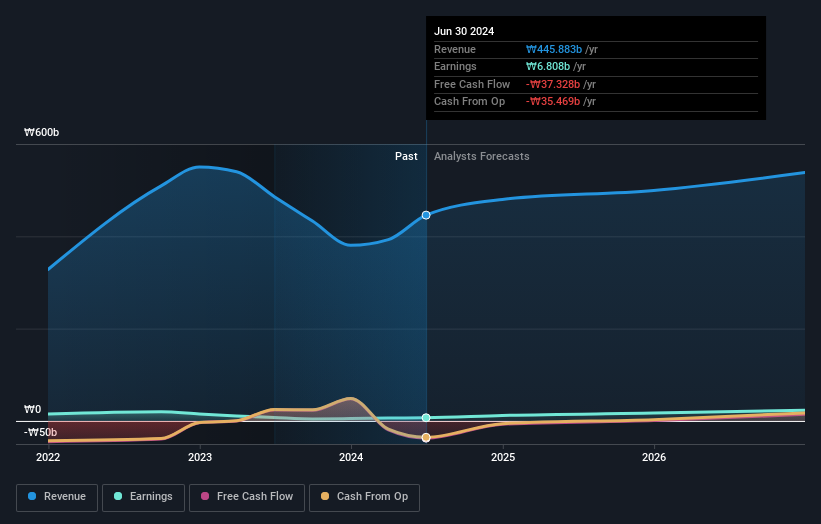Mirai Semiconductors Co., Ltd. (KOSDAQ:254490) adds ₩24b in market cap and insiders have a 74% stake in that gain
Key Insights
- Significant insider control over Mirai Semiconductors implies vested interests in company growth
- The largest shareholder of the company is Jung Lee with a 68% stake
- Past performance of a company along with ownership data serve to give a strong idea about prospects for a business
To get a sense of who is truly in control of Mirai Semiconductors Co., Ltd. (KOSDAQ:254490), it is important to understand the ownership structure of the business. With 74% stake, individual insiders possess the maximum shares in the company. Put another way, the group faces the maximum upside potential (or downside risk).
Clearly, insiders benefitted the most after the company's market cap rose by ₩24b last week.
Let's delve deeper into each type of owner of Mirai Semiconductors, beginning with the chart below.
Check out our latest analysis for Mirai Semiconductors

What Does The Lack Of Institutional Ownership Tell Us About Mirai Semiconductors?
Institutional investors often avoid companies that are too small, too illiquid or too risky for their tastes. But it's unusual to see larger companies without any institutional investors.
There are many reasons why a company might not have any institutions on the share registry. It may be hard for institutions to buy large amounts of shares, if liquidity (the amount of shares traded each day) is low. If the company has not needed to raise capital, institutions might lack the opportunity to build a position. On the other hand, it's always possible that professional investors are avoiding a company because they don't think it's the best place for their money. Mirai Semiconductors' earnings and revenue track record (below) may not be compelling to institutional investors -- or they simply might not have looked at the business closely.

Mirai Semiconductors is not owned by hedge funds. Our data shows that Jung Lee is the largest shareholder with 68% of shares outstanding. With such a huge stake in the ownership, we infer that they have significant control of the future of the company. With 5.4% and 0.03% of the shares outstanding respectively, Hyesook Jeon and Samsung Asset Management Company, Ltd. are the second and third largest shareholders.
While studying institutional ownership for a company can add value to your research, it is also a good practice to research analyst recommendations to get a deeper understand of a stock's expected performance. There is a little analyst coverage of the stock, but not much. So there is room for it to gain more coverage.
Insider Ownership Of Mirai Semiconductors
While the precise definition of an insider can be subjective, almost everyone considers board members to be insiders. Management ultimately answers to the board. However, it is not uncommon for managers to be executive board members, especially if they are a founder or the CEO.
Most consider insider ownership a positive because it can indicate the board is well aligned with other shareholders. However, on some occasions too much power is concentrated within this group.
It seems that insiders own more than half the Mirai Semiconductors Co., Ltd. stock. This gives them a lot of power. So they have a ₩190b stake in this ₩259b business. It is good to see this level of investment. You can check here to see if those insiders have been buying recently.
General Public Ownership
The general public, who are usually individual investors, hold a 26% stake in Mirai Semiconductors. While this group can't necessarily call the shots, it can certainly have a real influence on how the company is run.
Next Steps:
I find it very interesting to look at who exactly owns a company. But to truly gain insight, we need to consider other information, too. Case in point: We've spotted 3 warning signs for Mirai Semiconductors you should be aware of.
If you are like me, you may want to think about whether this company will grow or shrink. Luckily, you can check this free report showing analyst forecasts for its future.
NB: Figures in this article are calculated using data from the last twelve months, which refer to the 12-month period ending on the last date of the month the financial statement is dated. This may not be consistent with full year annual report figures.
Have feedback on this article? Concerned about the content? Get in touch with us directly. Alternatively, email editorial-team (at) simplywallst.com.
This article by Simply Wall St is general in nature. We provide commentary based on historical data and analyst forecasts only using an unbiased methodology and our articles are not intended to be financial advice. It does not constitute a recommendation to buy or sell any stock, and does not take account of your objectives, or your financial situation. We aim to bring you long-term focused analysis driven by fundamental data. Note that our analysis may not factor in the latest price-sensitive company announcements or qualitative material. Simply Wall St has no position in any stocks mentioned.
 Index Options
Index Options CME Group
CME Group Nasdaq
Nasdaq Cboe
Cboe TradingView
TradingView Wall Street Journal
Wall Street Journal